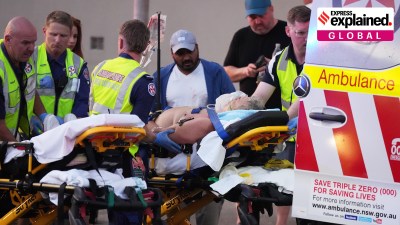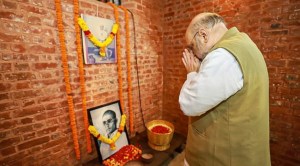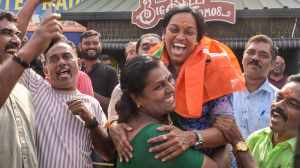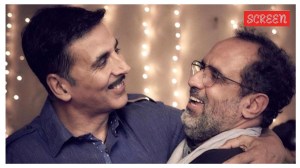‘I don’t have any fingers, but I can use the electronic machine’
Graham Staines, the Australian missionary who was burnt alive in Orissa along with his two sons, lived in a yellow painted cheerful cottage ...

Graham Staines, the Australian missionary who was burnt alive in Orissa along with his two sons, lived in a yellow painted cheerful cottage in the little town of Baripada in eastern Orissa. The swing that he built for his sons Timothy and Philip still hangs from the mango tree. But no one uses it now and it looks dusty and forlorn. Once two children played in this garden, ringed around with hibiscus bushes with a covered courtyard all around the tree. Today, they are both dead, burnt alive with their father.
‘‘Unassuming shy little boys,’’ says Solomon Soren, Staines’ helper for twenty years, now superintendent of the Baripada Leprosy Home that Staines used to run. ‘‘Always wanted to help.’’ When Dara Singh, accused in the Staines murder recently failed to file his nomination from the Puri parliamentary constituency, the ghosts of Graham, Timothy and Philip Staines may have laughed a little.
The Staines home occupies a corner of a fairly large grassy compound with a Baptist Church at its centre. Gladys Staines is away visiting her daughter Esther in Ooty and the premises look somehow raw and desolate, the floors scream of emptiness and the bright sunlight which comes beating down into the mango tree is terribly lonely. Where are those children, the sun seems to ask.
‘‘Gladys keeps the work of Graham alive. She looks after the Leprosy Home. But everyday the patients cry for dada. He was exceptional. He loved everybody. He spoke Santhali, Oriya, even the Ho language.’’ Soren was a student at the Maharaja Puran Chand Arts college when he met Staines. The Australian missionary was looking for a young translator to help him with his work with the Santhals and young bright Soren was ideal. ‘‘I too wanted to do something for my people,’’ he says, ‘‘Graham taught me how to help.’’
A few yards from the house, a new Graham Staines Memorial General Hospital is being constructed. It is to be a 20 bed hospital for general patients, particularly for cerebral malaria which is an epidemic in the area. A local doctor is supervising the construction.
A few kilometres away from the Staines house is the Leprosy Home established in 1897 by the then Maharaja. Subsequently several missionaries arrived to work here and the Home received a great number of international donations.
Staines arrived in the 60s, first to Rairangpur, then subsequently to Baripada. Shanti Mahto from Bhalokbinda and Sanki from Bangipur say they are still well looked after in the leprosy home but complain that every time elections come they never find their names on the rolls.
‘‘People in our villages don’t understand,’’ says John Sethi, once a leper, now cured. ‘‘We are all outcasts. Even when we are cured, our families can’t take us back because the village threatens to ostracise them. We are also outcasts from the election rolls. Our names are never on the voters’ lists. People think if you are a leper, you don’t want to vote.’’
But if they had a choice would they and for whom? Says Rosie, a young Muslim woman from Cuttack, ‘‘I would vote for haath (hand).’’
Some of Graham Staines’ patients have been living in the home for thirty years and remember him well. Nathan Munda was once a patient, now works as a manager. ‘‘He used to do seva. He used to love us. Now didi (Gladys) comes to give us treatment. Best of all, he treated us normally. Like we were normal people.’’
Sethi says there was a time when he really wanted to vote for the cow and calf symbol in his youth and stood in line during polls. ‘‘But everyone would run away from me when I went to the booth and when I got there, my name was never on the list.’’
He says the only places he’s visited beyond the leprosy home is Purulia and Kolkata where Staines sent him for reconstructive surgery. ‘‘The politicians are crazy. Who would harm a person like Graham? A man who comes from Australia to work among us lepers? They don’t let us vote. They burn him.’’
The Leprosy Home produces rope baskets, handloom rope mats and grows its own vegetables. There are clinics every afternoon, when cured patients treat others with dettol sponges. Have they heard of Dara Singh? ‘‘Please, no politics,’’ Soren says hastily. ‘‘We just want to get on with our lives. The government has been good to us and so far we have faced no trouble. Please don’t ask us about politics.’’
But Kali, an elderly patient is quick to add, ‘‘if you want us to talk about politics why don’t you tell the government to put our names on the voters lists? I don’t have any fingers, but I can still use the electronic machine.’’
Photos
- 01
- 02
- 03
- 04
- 05































